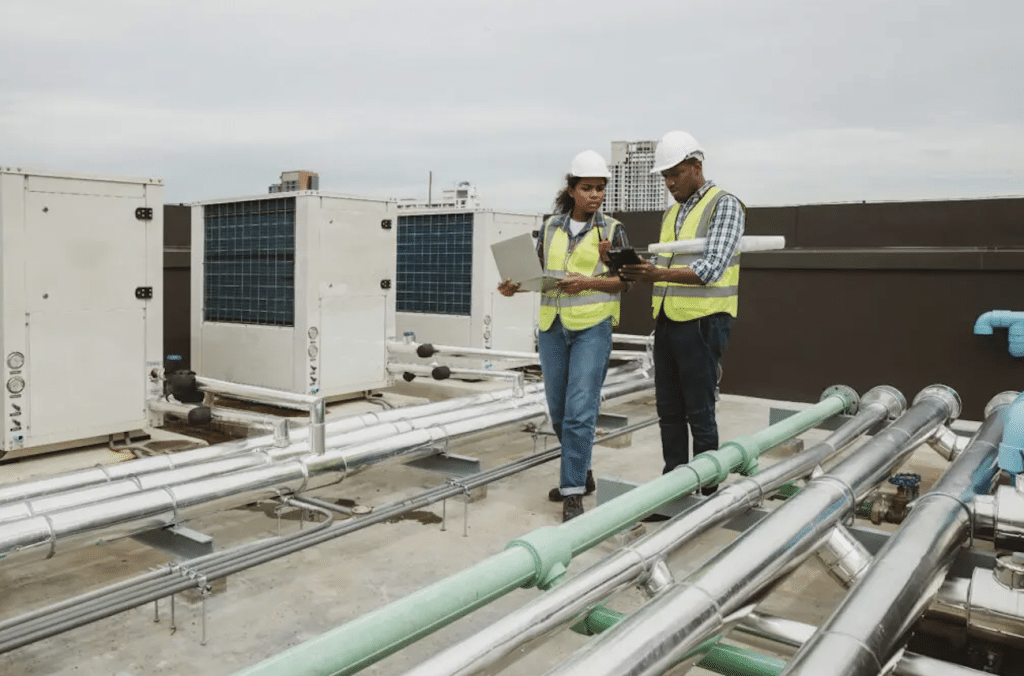Heating, Ventilation, and Air Conditioning (HVAC) systems are crucial in maintaining comfortable and healthy environments in commercial buildings. Whether it’s an office space, a retail store, or a large industrial facility, a properly installed HVAC system is essential for ensuring optimal air quality, temperature control, and energy efficiency. Proper HVAC installation is crucial in commercial settings for operational costs, comfort, and productivity, as poor installation can lead to system efficiency issues, costly repairs, and health hazards.
Energy Efficiency and Cost Savings
An HVAC system that is properly installed runs as efficiently as possible, lowering energy use and utility costs. Proper installation ensures the system is sized correctly for the building, with ductwork that allows air to flow freely without leaks or obstructions. An improperly installed HVAC system can be too large or too small for the space, leading to inefficiencies. An oversized system may short-cycle, turning on and off too frequently, which wastes energy and leads to wear and tear. On the other hand, an undersized system will need help to maintain the desired temperature, running constantly and consuming more energy than necessary.
Efficient operation isn’t just about immediate cost savings—it’s also about long-term savings. A correctly installed HVAC system lasts longer and requires fewer repairs. Since energy-efficient systems operate within their design specifications, they don’t experience the same stress and breakdowns that result from improper installation. This can save a company thousands of dollars in energy and maintenance costs throughout the system’s life. To explore services available in HVAC installation, you can click here to learn more.
Enhanced Indoor Air Quality
Proper HVAC installation is crucial for maintaining indoor air quality in commercial spaces, particularly hospitals, schools, and office buildings, to prevent the buildup of pollutants, allergens, and bacteria.
An improperly installed system may fail to provide adequate ventilation, allowing contaminants to accumulate in the air. Inadequate ventilation can also lead to moisture problems, increasing the risk of mold growth and posing severe health hazards. Proper installation, including correctly sized ductwork and appropriate filtration systems, ensures that the HVAC system can effectively remove contaminants, maintain adequate humidity levels, and constantly supply fresh air. This protects the health of building occupants and creates a more comfortable and productive environment.
Extended System Lifespan
Any business can benefit significantly from an HVAC system; optimizing its longevity requires expert installation. When installed correctly, HVAC systems operate smoothly without the unnecessary strain caused by improper sizing, poor airflow, or incorrect refrigerant levels. These factors contribute to wear and tear over time, leading to frequent repairs and eventually requiring the system to be replaced earlier than expected.
In contrast, a properly installed system operates within its intended parameters, reducing the likelihood of malfunctions and breakdowns. Regular maintenance is still necessary, but starting with a well-installed system can extend its operational life by years, saving businesses from the high cost of premature replacement.
Improved Productivity and Customer Satisfaction
A comfortable indoor environment directly affects employee productivity and customer satisfaction. Employees may become uncomfortable, distracted, or tired in workplaces with poorly controlled temperatures, reducing productivity. Similarly, in retail or hospitality, customers are less likely to linger or make purchases if the environment is too hot, cold, or stuffy.
Companies may establish a setting that promotes consumer comfort and employee well-being by ensuring that HVAC systems are installed correctly. Employees who feel at ease are more attentive and efficient, and happy clients are more likely to enjoy their visit and come again.
